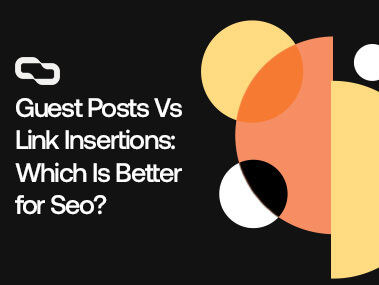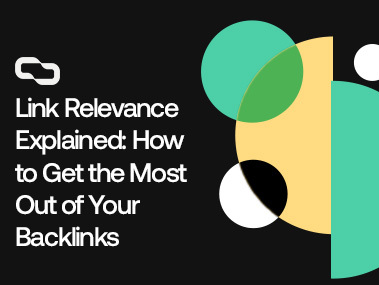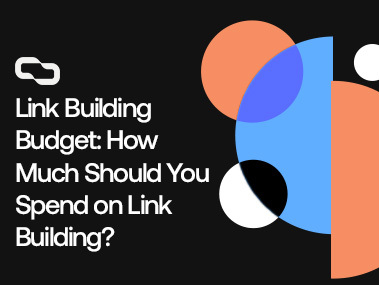The 14 Top Black Hat Link-Building Strategies in 2024
I don't care if people call this strategy white hat, black hat, or blue hat.
If it's going to make me money, I'll use it.
I'm not stupid, though — I think.
I understand that some link-building strategies carry more risk than others.
And we're here today to talk about the risker ones, commonly known as black hat link-building strategies.
In this article, I'll tell you everything you need to know about black hat link-building.
From the pros and cons to the 14 top black hat link-building strategies and the risks associated with each one.
Key Takeaways
- Black hat link-building refers to manipulative tactics that exploit loopholes in search engine algorithms for higher rankings.
- Black hat techniques are sometimes used due to their potential for significant results and the highly competitive nature of Search Engine Optimization.
- Examples of black hat SEO techniques include buying backlinks, using PBNs, link farms, tiered link-building, use of link-building software, and negative SEO.
What is Black Hat Link Building?
Black hat link-building refers to any link-building practice that tries to manipulate search engines for higher rankings.
But what does it mean to “manipulate search engines”?
When I build a backlink, I add a keyword in the anchor text because I know this will help me rank higher — does that mean I'm a black hat SEO?
Well, in that case, we could say that this is just a “best practice”.
But when you look at it, your job as an SEO specialist is all about gaming the system.
You try every tactic you can to make the algorithm like your page and rank it higher for the keyword — but if you outrank someone who has better content, does that make you a black hat SEO?
After all, you “manipulated the search engine bots” into thinking your page is better, right?
Okay, maybe this definition isn't good enough.
Let's say that black hat link-building refers to the act of acquiring backlinks by unethical means.
That's a great definition. However, when you look at what SEOs consider black hat tactics, you'll find that besides two or three strategies, most of them are ethical.
Why don't you tell us the right definition of black hat link-building then smart ass? You might say.
Well, one thing all black hat link-building strategies have in common is that they are pretty risky.
You can have great results with them, but when Google catches you, they'll penalize your website.
They are link-building techniques that exploit loopholes in search engine algorithms.
And since algorithms improve constantly, black hat link-building is a short-term strategy.
Why SEOs Use Black Hat Link Building Strategies?
The appeal of black hat link-building lies in its ability to give you an edge over your competitors.
SEO is a very competitive space, and there are only a few winners.
A recent study by FirstPage showed that the top 3 results alone get about 68.7% of the total traffic.
This leaves all the remaining pages with less than 30% when you consider ads CTR.
In fact, if you're ranking 7th, you might not even get 2% of the total traffic!
All that hard work reaps you almost nothing — so sometimes it's worth it to use black hat link-building tactics to boost your page up to the money-making spots.
Another reason why SEOs use black hat link-building techniques is to be able to compete against big authority sites.
How on earth would I be able to compete against Forbes?
They are coming after every lucrative keyword out there, and there is nothing I can do about it — unless I use some black hat techniques, of course.
Finally, in very competitive niches, such as CBD and Casino, almost all SEOs use these techniques.
And if your competitors are using them, you have no other choice but to do so.
Why You Shouldn't Use Black Hat Link Building?
There are many reasons why you should avoid black hat tactics, such as:
- The algorithms keep getting better. Black hat link-building is all about exploiting loopholes in algorithms, but these loopholes are often fixed. The techniques that used to work a few years ago are now useless.
- Google penalties can be ruthless. We're not just talking about a gentle slap on the wrist. Most of the time, SEOs that take part in black hat link-building schemes lose their rankings, traffic, and in severe cases, their entire website will get deindexed from Google.
- It's not cheap. The cost of black hat link-building is often overlooked in the discussion about its pros and cons. These techniques require a substantial initial financial investment. For example, establishing a Private Blog Network (PBN) involves purchasing multiple expired high-domain authority websites, hosting, and managing them. This isn't cheap at all.
- Very slow recovery. If you got hit by a manual penalty, it could take you several months of work to recover from it. That's why most black hat SEOs just ditch their websites when they get a penalty.
Black Hat vs. White Hat vs. Gray Hat
In SEO, strategies are often classified into three categories: Black Hat, White Hat, and Gray Hat.
Black Hat SEO, as discussed, refers to the risky tactics that can lead to fast, significant results.
Those strategies directly violate search engine guidelines.
If you got caught practicing black hat link-building, your website could face severe penalties, and your search engine ranking could plummet overnight.
On the other end of the spectrum, you have the good folks, the White Hat SEOs.
They believe in abiding by the rules, following Google's guidelines like a law-abiding citizen.
They focus on creating high-quality content and building organic backlinks.
White hat link-building tactics are less about gaming the system and more about providing value to the users.
The reward? Steady, sustained growth.
The caveat? It can be slow, and patience is a virtue you must have in spades.
And right in the middle, you've got the Gray Hats, a blend of the rule-breaking black hats and rule-abiding white hats.
They aren't entirely unethical, but they're not exactly saints either.
Gray Hat SEOs are willing to bend the rules a bit, to take some calculated risks, but they stop short of outright breaking them.
They're all about finding the sweet spot, balancing risks with rewards, and finding a middle ground between quick gains and long-term stability.
Black Hat Link Building Techniques
In this section, I'll get into the different link-building techniques that most SEOs consider black hat.
Since not all these strategies are equally risky or effective, I'll try to score each of them based on their effectiveness and their risk of triggering a penalty.
It's important to mention that those are just rough estimates, so take them with a grain of salt.
1. Buying Backlinks
- Effectiveness: 3/5
- Risk: 0.5/5
Yep, you read it right.
Paid links are considered a black hat SEO technique, and by buying I don't just mean exchanging money for links.
I'm talking about offering free products in exchange for a “review”, link swaps, or any sponsored links that aren't marked no-follow or sponsored.
What about guest posting — that's a white hat link-building technique for sure, right?
Well, it depends on how you look at it.
In guest posting, you're offering content in exchange for a link.
So you're basically exchanging time for a link.
Now, I could argue that time is money, and instead of writing this guest post, you could have mowed your neighbor's lawn and made some money.
Another example would be hiring a writer to write the piece for you or a virtual assistant to take care of link outreach.
No matter how you look at it, you're basically spending money to get links.
Google wants you to earn your backlinks, not to buy them — or engage in any sort of link-building as a matter of fact.
It wants you to trust the algorithm and focus on generating quality content.
But that's just its utopian dream.
Everyone and their mother is buying blackhat backlinks, and if you play by the rules, you won't be able to compete at all.
2. Private Blog Networks (PBNs)
- Effectiveness: 4/5
- Risk: 2.5/5
A PBN (Private Blog Network) is a network of shell websites created for the sole purpose of building powerful backlinks to high-value money pages.
Basically, someone buys a punch of expired domains with high DR, interlinks them to improve their link juice even further, and then uses the network to build super-jacked backlinks to their money site.
Since these backlinks are very powerful (way more powerful than your normal links), they really move the needle and help the owner to shoot to the top of Google SERPs for their lucrative keywords.
Now, I don't care what everyone says about PBNs.
They are riskier than other link-building techniques, but they do really work.
In fact, you can't even rank in some niches without using them — definitely not talking about the Casino and CBD industries *ehm*.
3. Link Farms
- Effectiveness: 2/5
- Risk: 1/5
Link farms are pretty similar to PBNs but instead of passing link juice to the creator money pages, they exist to sell links.
Do you know those DR 40 websites with a write-for-us page, low-quality content on almost every topic on earth, and poor magazine design?
Yep, those are the ones I'm talking about.
Black hat SEOs use these farms to build a lot of cheap links, manipulating Google into thinking that they have a big authority site — at least for a while.
However, Google has become very good at catching link farms.
In fact, they catch and penalize hundreds of farms per day.
When Google catches a link farm, it devalues all of its links, rendering them useless.
The reason why I gave link farms only 0.5 in risk is that most of the time, you won't get any penalties for using them.
You'll just lose the SEO boost these links used to give to you, which will result in ranking drops — not a huge deal compared to other tactics.
If you have a lot of links from link farms, however, you might get a manual penalty, so be careful.
This black hat link-building technique is often used in the Churn and Burn SEO strategy, where an SEO tries to rank a website for lucrative keywords before Google catches and penalizes it.
4. Tiered Link Building
- Effectiveness: 3/5
- Risk: 2/5
Tiered link-building is the practice of building links on multiple tiers or levels to pass link juice and help your pages rank higher.
This is better explained with an example, so let's say you have a website A.
You did your analysis and figured out that you need 3 backlinks to rank.
So you get links from websites B, C, and D.
Those are your tier 1 links. They are the links that point directly to your website.
Now, most of the time when we're building links, we build guest posts because this looks more natural to Google.
The problem is that links on new pages are weak.
They don't have a lot of power, or what we call link juice.
In tiered link-building, we build backlinks to those new pages, increasing their power.
So we go about building 3-5 links to each tier 1 link we got.
Those are our tier two backlinks.
Usually, we stop at tier 3, as our data shows that you don't get a lot of juice after that.
Why don't you just build all those links to your money page instead? You might ask.
Well, it's because we often use PBNs and lower-quality links for our tiered systems.
Links that pass a good chunk of link juice, but I don't want to be directly associated with them.
So by building those links for my backlinks, I still get some value, and I add 2 or 3 layers of separation between my website and the PBNs.
That's why it only scores 2 on the risk.
5. Link Building Software
- Effectiveness: 3/5
- Risk: 4/5
Back in the day, the more links you had, the higher you'd rank.
Well, it's somehow true now, but back then the quality of the links didn't really matter.
Whether it's a backlink from an authoritative blog or a low-quality directory.
A link is a link. Both would pass link juice, even if it's not considered a natural backlink.
SEOs exploited the PageRank algorithm and used link-building software like GSA Search Engine Ranker, Scrapebox, Money Robot, etc. to generate thousands of backlinks from Web 2.0 sites, directories, social bookmarking sites, and even blog comments.
Thankfully, these days are far gone.
The PageRank algorithm now focuses on the quality of the links rather than the total number of backlinks a page has.
Google also got a lot smarter and became able to detect and penalize websites involved in automated link schemes.
However, that didn't stop SEOs from gaming the system.
Some black hat SEOs use software to generate thousands of blog comments and forum links, but not to their main site.
They use them as tier 3 links — Yep, it's all connected together.
6. 301 Redirects
- Effectiveness: 4/5
- Risk: 1/5
When a business closes its doors, it drops the domain name associated with this company.
Most of the time, these domains have great SEO value because they can have pretty good links.
I'm talking about links from The New York Times, Fortune, The Guardian, Wise, etc.
Now, SEOs buy those expired domains and redirect them to their website, making Google think that they earned those high-quality links fair and square.
The risk associated with this technique depends on 2 factors:
- How relevant the domain is to your website
- How do you redirect it
The safe way to do it is to look for an expired domain that is relevant to your industry, and then redirect it as if a company acquired another one.
Think of The New York Times when they bought The Wirecutter.
The risky way is to buy any domain that has good links regardless of its relevance and redirect it to one of your high-value money pages to get an instant boost.
In this case, the effectiveness would be 5/5 and so as the risk.
7. Hacked Links
- Effectiveness: 3/5
- Risk: 5/5
Hacking into other sites to add your backlinks is a severe black hat technique.
Not only is it unethical, but it's also illegal, and you could face criminal charges, not to mention severe penalties from search engine crawlers if they found out.
This technique scores only 3/5 in effectiveness because you can only exploit websites with weak security.
This often leads to getting links from low-quality, irrelevant domains.
You can't get a lot of those links, but it'll be really hard to get the relevance signals Google needs with this technique.
It's important to mention that hacked links are different than link insertions. Link insertions are done with the approval of the webmaster, hacked links aren't.
8. Site Wide Footer Links
- Effectiveness: 2/5
- Risk: 4/5
In this black hat SEO technique, you add an exact match anchor link to the footer section of a website.
This is the equivalent of having a backlink from every page this website has, which passes a lot of link juice.
However, this backlink type isn't as powerful as it used to be, as Google gave less weight to site-wide links.
9. Hidden Links
- Effectiveness: 2/5
- Risk: 4/5
There are many techniques for hiding links, such as using white text on a white background, hiding them behind images, or using CSS to make the link zero-sized.
At first, it might not make sense to hide links from users.
However, there are some use cases where hiding links is beneficial for black hat SEOs.
For example, when hacking into a website to add links, it's often a common practice to hide the links to avoid being caught by the website owner.
Another example would be if you're building backlinks to NSFW sites, and you don't want users to report the links.
You can also use hidden links for keyword stuffing and many black-hat SEO tactics.
10. Overoptimized Anchors
- Effectiveness: 5/5
- Risk: 5/5
Anchor text is the blue underlined text that contains the link, and it's one of the ways Google determines the relevancy of web pages.
It's believed that anchor text is a ranking factor, meaning that keyword-rich anchors do help you climb up the Search Engine Results Pages.
Black hat link builders abuse this fact, and they build almost all of their links with exact match anchors to manipulate search engine algorithms.
This can give them a huge boost but for a short period of time, as Google tends to penalize overoptimization pretty quickly.
11. Adding Links Widgets, Plug-ins, or Themes
- Effectiveness: 3/5
- Risk: 2/5
This tactic involves embedding links into free widgets, plugins, or themes.
When users install these, they unknowingly link back to your site.
The keyword here is unknowingly.
It's a standard white hat link-building practice to add a link back to your website when you create a widget, a calculator, or even allow bloggers to embed your infographics into their websites.
It becomes black hat when you're hiding the links from your user.
12. Negative SEO
- Effectiveness: 2/5
- Risk: 0/5
Do you know how Google is getting better and better at catching and penalizing SEOs that use black hat link-building techniques?
Well, black hat SEOs use this to their advantage by simply making it look like their competitors are using black hat techniques.
For example, one of your competitors could start a negative SEO campaign targeting your website.
They'd build a lot of spammy links, redirect adult and other NSFW sites to your money pages, use software to build thousands of exact match anchor links, etc.
Google is becoming better at recognizing these attacks, but if you're on the receiving end, it can still cause a great deal of trouble.
The scoring for this technique is a bit different, though.
There is almost no risk for you if you used this technique because it can't be traced back to you — unless you really screwed up.
As for effectiveness, I only gave it 2/5 because since Google expanded into natural language processing (NLP), it became very good at detecting and devaluing irrelevant, low-quality links.
So thankfully, this strategy isn't as effective as it used to be.
It can be a little effective against new and small sites with weak authority, so be careful.
13. Cloaking
- Effectiveness: 5/5
- Risk: 5/5
Cloaking is the sneaky tactic of showing one piece of content to search engines and a different one to visitors.
This technique is used to manipulate search engine rankings by presenting content that has been specifically optimized for ranking while showing users something else entirely.
This black hat SEO technique is often used to sell shady products, such as “cheap Viagra”.
14. Doorway Pages
- Effectiveness: 5/5
- Risk: 5/5
The Doorway technique is similar to cloaking but instead of delivering 2 different versions of content for visitors and search engines as in cloaking, doorway pages redirect visitors to an entirely different web page.
Honestly, neither cloaking nor doorway pages are considered black hat “link-building” techniques.
They are black hat SEO content strategies, but two of my competitors for this keyword mentioned them, so, now, I have to cover them in my article to satisfy the search intent and leave no content gaps — thanks a lot lads.
FAQs
Is Buying Links Black Hat?
Buying links is considered a black hat technique, but everyone is doing it. So unless you're buying low-quality backlinks, you'll be fine.
What Is the Black Hat Technique?
The black hat technique involves using PBNs, participating in link farms, cloaking, buying hacked links, and low-quality 301 redirects.
Is Black Hat Link Building Illegal?
Black hat link-building isn't illegal, they're just against Google guidelines. In short, they won't get you in jail, but they can get your website penalized.
Conclusion
Black hat link-building may offer tempting shortcuts to achieve higher search rankings in the competitive world of SEO, but it comes with substantial risks and consequences.
These manipulative tactics exploit loopholes in search engine algorithms, which can provide significant gains in the short term.
However, as algorithms continue to improve, the effectiveness of these strategies diminishes, and the chances of being caught and penalized by search engines increase.
If you're looking for a link-building service that uses best SEO practices, we're here to help.
We have years of experience in building high-quality backlinks that both users and search engines love.
Feel free to book a courtesy consultation call with one of our expert link builders and we'll determine the best backlink package based on your budget and goals.
Find out your exact cost of ranking for your dream keyword
Let’s get you ranking now
If you want the team at Get Me Links to help you get more traffic



